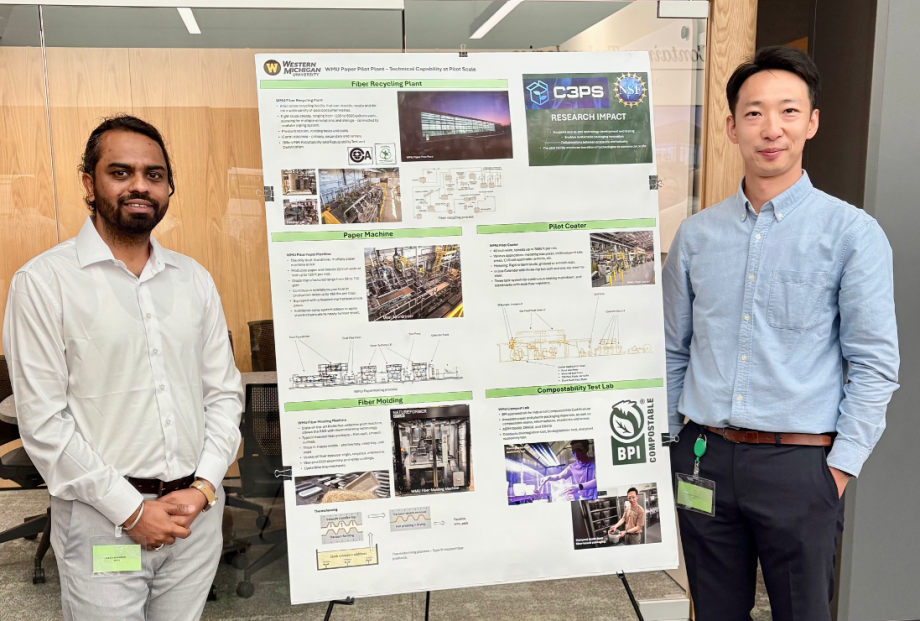WMU co-leading new NSF-funded center dedicated to advancing sustainable packaging
KALAMAZOO, Mich.— With support from the National Science Foundation (NSF), Western Michigan University is taking on a leadership role with the newly established Center for Plastic, Paper and Hybrid Packaging End-of-Life Solutions (C3PS). The center is focused on developing solutions to pressing issues related to the amount of plastic waste and plastic-coated paper waste produced in the United States.
“At WMU, we are uniquely positioned to lead the transition to next-generation, fully recyclable and compostable paper-based packaging solutions,” says Dr. Kecheng Li, professor and chair of the Department of Chemical and Paper Engineering.
C3PS, which is the first Industry–University Cooperative Research Center (IUCRC) funded by a $1.5 million grant from the NSF, is dedicated to advancing sustainable packaging materials and circular economy solutions. The center supports pre-competitive, collaborative research to address the urgent environmental challenges tied to packaging waste. C3PS has signed on 10 companies as center members to involve industry leaders across packaging, paper, plastic and food sectors.
“This is not just about making packaging greener—it’s about transforming the materials that touch nearly every aspect of our daily lives,” said Li, who serves as principal investigator (PI) and site director for this center at WMU.
This initiative is jointly led by Michigan State University’s School of Packaging and WMU’s Department of Chemical and Paper Engineering—and they are the only two universities selected to anchor this national innovation hub.
WMU’s contributions to C3PS focus on developing recyclable paper and bio-based paper coatings that eliminate the use of per- and polyfluoroalkyl substances (PFAS) and prevent microplastic formation, enabling more paper-based materials to replace plastic in food and industrial packaging applications.
Through C3PS, WMU faculty, including co-PIs Dr. Said Abubakr, Dr. Alexandra Pekarovicova, Dr. Mert Atilhan, Dr. Priyanka Sharma, Dr. Jason Wang, and students will work closely with industry members to translate scientific discoveries into scalable technologies while building a workforce trained in circular materials and sustainable engineering.
This center reinforces WMU’s leadership in bio-based innovation and its national impact on sustainable materials research.
“WMU is proud to co-lead this transformative initiative. C3PS exemplifies our commitment to sustainability, innovation, and industry collaboration,” says Dr. Steve Butt, dean of WMU’s College of Engineering and Applied Sciences. “By advancing research in recyclable and biodegradable packaging, we are not only addressing urgent environmental challenges but also preparing our students to become leaders in the circular economy.”
The center has three primary objectives. The first is to conduct high-impact research in packaging to address the shared needs of companies of various sizes. Additionally, it aims to strengthen the United States' global leadership in the advancement of innovative packaging technology. Lastly, it is working towards developing a highly skilled workforce in the manufacturing sector.
The work of C3PS will focus on achieving these objectives via its two main research areas—plastic and paper and paper-plastic hybrids. Research on plastic will be focused on designing recyclable and biodegradable plastics for safe, zero-waste plastic packaging solutions, while also improving existing recycling technologies.
Meanwhile, paper and paper-plastic hybrid research will involve using these hybrid materials to eventually develop safe, recyclable and biodegradable products—and with it, recycling methods for hybrid products, developing recyclable paper additives and creating consumer ready products with recycled paper.
“The work of this center will directly impact the way food, consumer goods and industrial products are packaged and recycled,” Li adds. “Our goal is to make sustainable packaging not only feasible but practical—improving recycling rates, reducing microplastic pollution and helping companies meet new environmental standards. At the same time, we are training a highly skilled workforce, giving our undergraduate and graduate students hands-on experience that positions them to drive innovation in industry and beyond.”
For more WMU news, arts and events, visit WMU News online.



